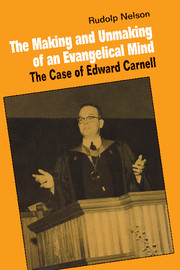VII - Apologetics of the mind: toward the penumbral zone
Published online by Cambridge University Press: 10 December 2009
Summary
In his novel Beecher, Dan McCall has the Reverend Henry Ward Beecher counsel his younger brother Tommy, who has been reexamining his theological beliefs: “If you wish to compute your doctrinal latitude you may discover much more than you wish to know, Tommy. Evade exact definition, and keep the fruits of faith.” Whatever whiff of practical wisdom we sense in Beecher's statement, the advice exudes more pervasively the sweet prudential smell of worldly success. At all costs “keep the fruits of faith” – whether internal or external. And if that means ignoring the hard questions, or pirouetting around them like a dancing bear, so be it.
Tommy would never have received that kind of advice from Edward Carnell. Hard questions about the Christian faith were not to be evaded. By nature and profession he was more like another character from contemporary fiction. In Frederick Buechner's novel The Final Beast, Rooney Vail, an offbeat and strikingly attractive young married woman, joins the Reverend Theodore Nicolet's church more to please her husband than out of any personal conviction. In fact, she is quite outspoken about her lack of interest: “If I were God,” she says, “I'm damned if I'd be so interested in religion and churches. I'd be interested in making things. I'd always be making marvelous new worlds, and marvelous new kinds of people to put in them … babies.” Nevertheless, as often happens, it is she rather than her husband who comes regularly to church.
- Type
- Chapter
- Information
- The Making and Unmaking of an Evangelical MindThe Case of Edward Carnell, pp. 125 - 150Publisher: Cambridge University PressPrint publication year: 1988



